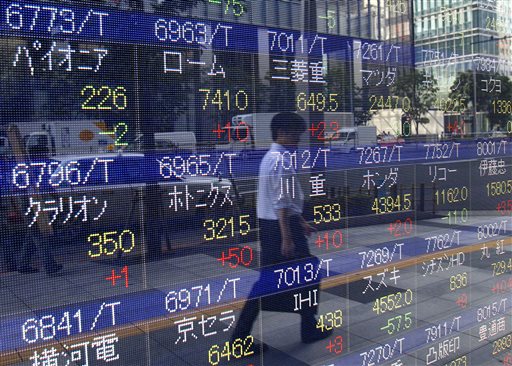Asian shares mixed as dealers mull yuan devaluation

A man is reflected on an electronic stock indicator of a securities firm in Tokyo, Tuesday, Aug. 11, 2015. Global stocks and Asian currencies fell Tuesday after China unexpectedly devalued its yuan in response to weakening trade and growth. AP PHOTO/KEN ARAGAKI
HONG KONG–Asian shares were mixed on Tuesday, with Shanghai and Hong Kong ending rollercoaster sessions flat as investors weighed news China’s central bank is devaluing its currency while other regional markets fell.
Tokyo closed down 0.42 percent, or 87.94 points, at 20,720.75 while Sydney fell 0.65 percent, or 35.96 points, to close at 5,473.2.
South Korean shares fell 0.82 percent after disappointing earnings, with the benchmark KOSPI index ending down 16.52 points at 1,986.65.
But Hong Kong and Shanghai both ended see-saw sessions around the flatline, after China announced a sharply lower daily reference rate for the yuan against the US dollar.
The 1.86 percent cut–the largest since the yuan was unpegged from the greenback in 2005–comes as speculation mounts China is preparing to widen its currency trading band for the first time since March 2014.
Weak trade and inflation data released last weekend reinforced concerns that growth is slowing in the world’s second-largest economy.
“Policy makers and the central bank are still very concerned about the overall economic-growth momentum,” Qian Wang, Hong Kong-based senior economist for Asia Pacific at Vanguard Group, told Bloomberg News.
“China has suffered because of the strengthening of the currency.”
In Hong Kong, the benchmark Hang Seng Index edged down 22.91 points to end the day at 24,498.21 on turnover of HK$96.1 billion (US$12.4 billion).
On the mainland, the benchmark Shanghai Composite Index dipped 0.51 points to close at 3,927.91 on turnover of 712.3 billion yuan ($114.3 billion).
The Shenzhen Composite Index, which tracks stocks on China’s second exchange, added 0.41 percent, or 9.43 points, to 2,284.27 on turnover of 623.1 billion yuan.
Chinese aviation shares were hit hard by the yuan move on fears the weaker currency could hurt profits and make servicing their dollar-denominated debt more expensive.
In Hong Kong, China Southern Airlines led the slump to end down 18 percent at HK$6.76, while China Eastern Airlines lost 16.5 percent to close at HK$5.45 and Air China sank 13 percent to HK$7.40.
On the mainland Shanghai Juneyao Airlines dropped 2.47 percent to 61.67 yuan and Hainan Airlines lost 3.52 percent to 5.48 yuan.
Asian currencies under pressure
News of China’s move sent ripples through Asia’s currency markets, pushing the Australian dollar–often seen as a proxy for the yuan–down more than one percent.
The US dollar gained against other regional currencies, trading at 124.81 yen compared with 124.72 in New York on Monday, and rising against the South Korean won and Indian rupee.
The People’s Bank of China’s announcement “looks to be a move to a more open market policy,” Stephen Innes, a senior trader at OANDA, told Bloomberg News.
“Traders are looking for US dollar strength across the Asia region and pressure on all local currencies.”
The euro dipped after news that Greece has reached an agreement with its creditors on fiscal targets, leaving it on course for a bailout deal to avert an Aug. 20 default.
The single currency changed hands at $1.0970 and 136.91 yen against $1.1019 and 137.31 yen.
The yuan move was also seen as bearish for commodities, as it could make it more expensive for buyers in China–a major importer of metals, grains and energy–to pay for dollar-denominated goods.
Oil prices were also under pressure as dealers eyed the latest US energy report for clues about demand in the world’s top crude consumer.
US benchmark West Texas Intermediate for September delivery fell 33 cents to $44.63 while Brent crude for September eased 30 cents to $50.11 in afternoon trade.
Safe-haven gold fetched $1,110.35 compared to $1,094.78 late Monday.
Shanghai stocks surged Monday on news Beijing is making fresh moves to support equities, and on hopes of an overhaul of the country’s inefficient government-backed companies.
Beijing has unleashed an unprecedented wave of measures to stop a rout in its share markets, moves which central bank data showed Tuesday had driven up bank lending some 17 percent to 1.48 trillion yuan between June and July.
In other markets:
— Bangkok fell 0.83 percent, or 11.81 points, to 1,408.32.
Telecoms company Advanced Info Service slid 3.72 percent to 233 baht, while Airports of Thailand lost 3.87 percent to 273 baht.
— Malaysia’s main index lost 1.07 percent, or 17.66 points, to close at 1,636.71.
Felda Global Ventures shed 3.70 percent to end on 1.56 ringgit, and AMMB Holdings lost 3.31 percent to close at 5.26 ringgit.
— Singapore closed down 1.36 percent, or 43.60 points, to 3,153.06.
DBS Bank fell 2.90 percent to Sg$19.73 while Singapore Telecom was down 1.72 percent to Sg$3.99.
— Jakarta ended down 2.66 percent, or 126.36 points, at 4,622.59.
Oil and gas exploration firm Sugih Energy gained 1.55 percent to 394 rupiah, while lender Bank Mandiri fell 3.94 percent to 9,150 rupiah.
— Mumbai fell 0.84 percent, or 235.63 points, to 27,866.09.
Software giant Infosys rose 2.07 percent to 1104.35 rupees but Tata Steel slumped 5.46 percent to 246.90 rupees.
— Wellington ended down 0.73 percent, or 42.67 points, at 5,822.35.
Spark New Zealand fell 2.41 percent to NZ$2.84 while Air New Zealand gained 0.19 percent to NZ$2.695.
— Taipei fell 72.70 points, or 0.86 percent, to 8,394.14.
Fubon Financial Holding lost 2.41 percent to Tw$56.8 while Nan Ya Plastics Corp shed 3.44 percent to Tw$61.8.
— Manila added 0.48 percent, or 36.10 points, to 7,570.45.
Top-traded SBS Philippines rose 35.92 percent to 5.60 pesos, while Universal Robina was up 1.73 percent to 199.90 pesos.